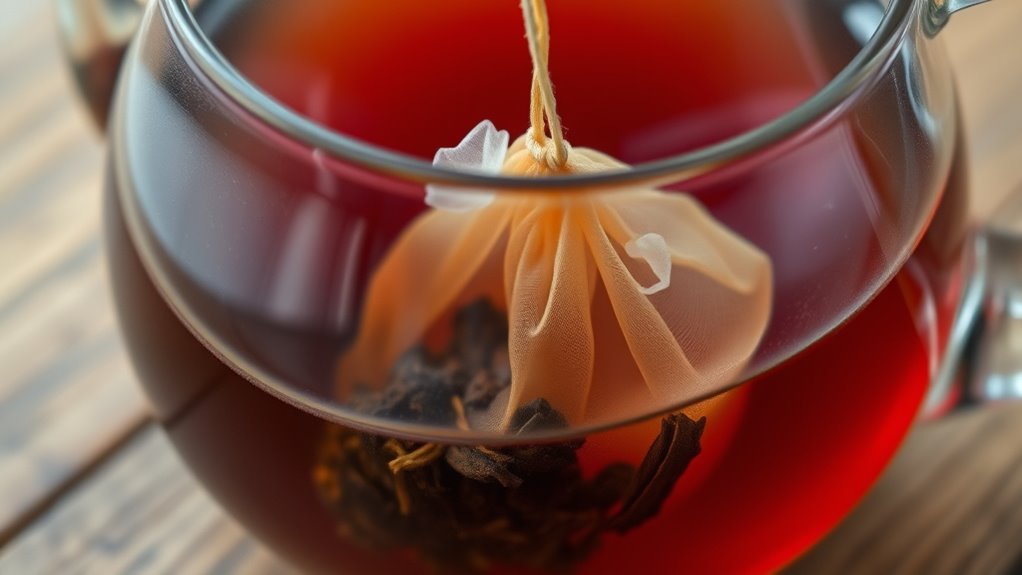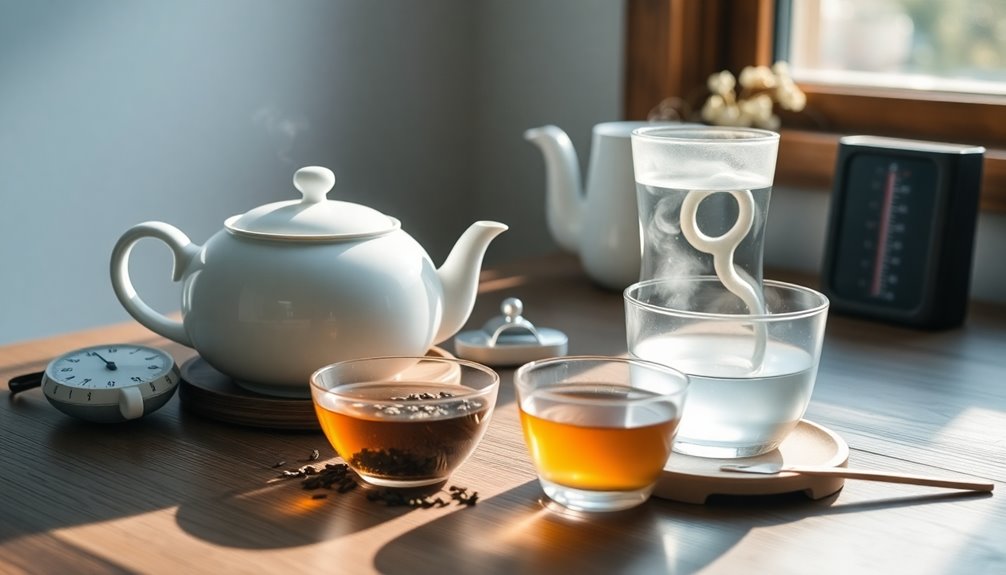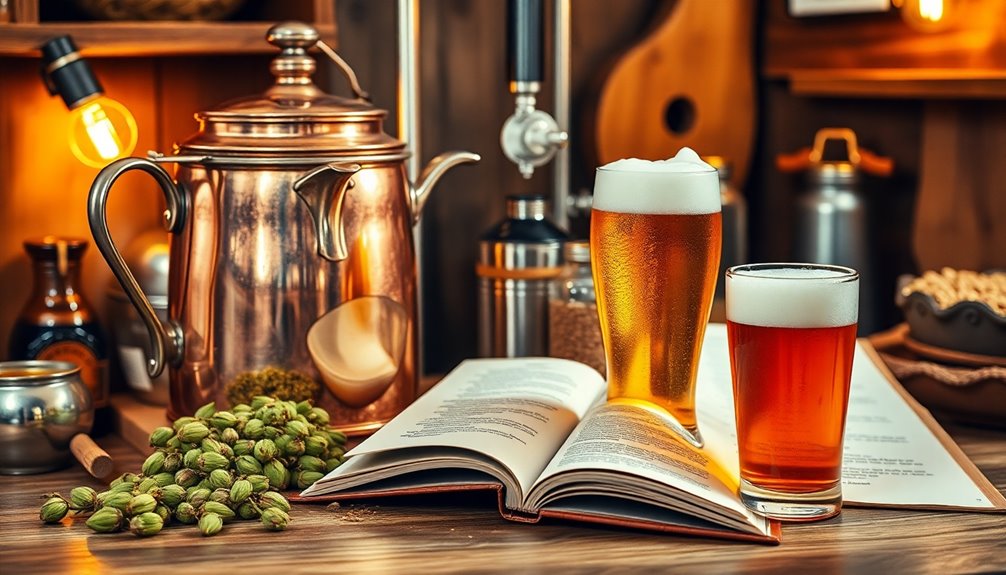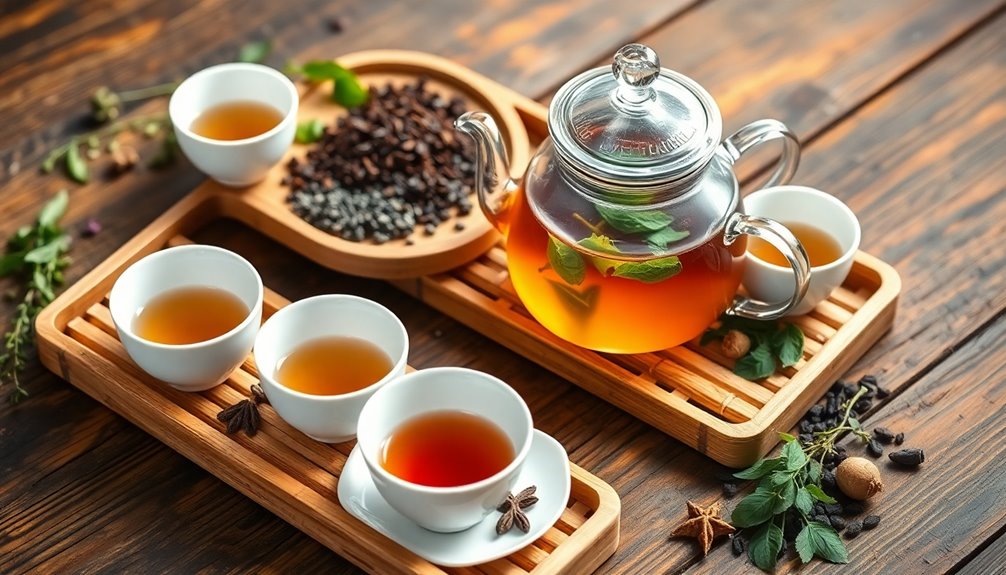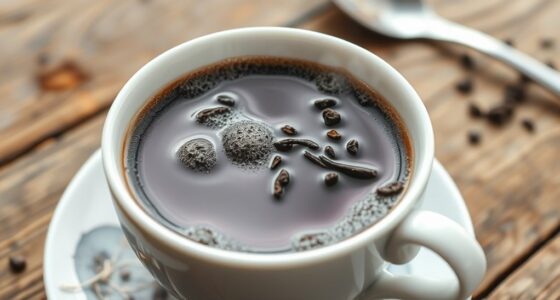If you over-steep your tea, you’ll notice increased bitterness, dryness, and a dull flavor, with the aroma becoming overpowering or dull. Other signs include a puckering sensation on your palate or an off-putting taste. To recover, try diluting your tea, adding sweeteners or milk, or quickly pouring it out and starting fresh. For more tips on spotting over-steeping and fixing it, keep exploring how to perfect your brew.
Key Takeaways
- Look for increased bitterness, dryness, or puckering in the tea’s taste, indicating over-extraction.
- Notice dull, flat flavors and a dull aroma as signs of over-steeping.
- Detect a dry or astringent mouthfeel that lingers, signaling over-extraction.
- Address over-steeped tea by diluting with hot water or adding sweeteners to balance flavors.
- Prevent over-steeping by using timers, shorter steeping times, and monitoring brew duration carefully.
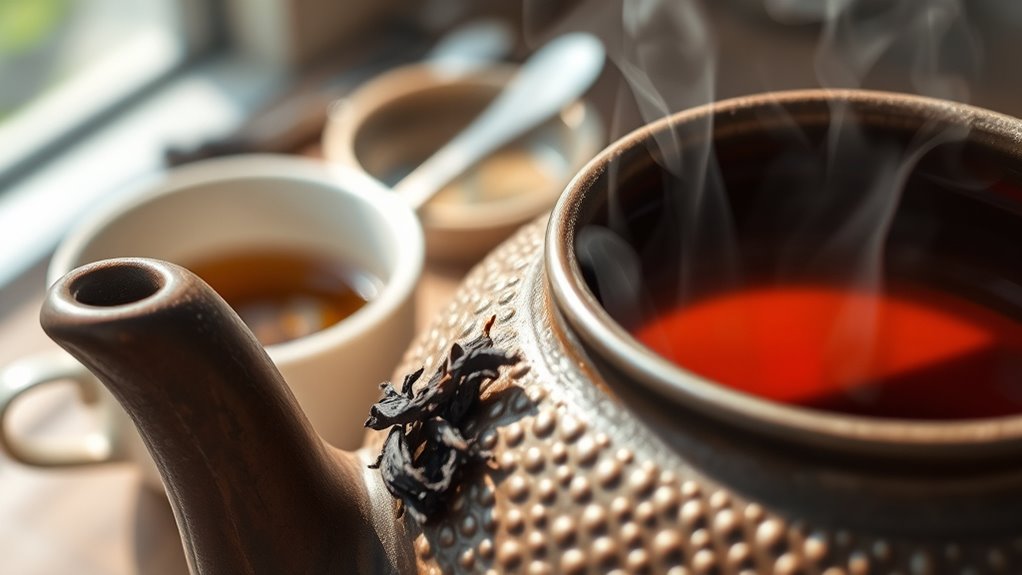
Steeping tea or herbs for too long can quickly lead to a bitter, over-strong flavor that masks the delicate notes you’re aiming for. When you leave your tea in the water too long, the natural compounds responsible for flavor release become over-extracted. This results in tea bitterness—an unpleasant, sharp taste that dominates the cup. Recognizing when you’ve over-steeped is essential because it allows you to take quick steps to restore flavor and enjoy your tea at its best.
Over-steeping causes bitterness by over-extracting flavor compounds, masking delicate notes and dulling the tea’s character.
One of the clearest signs of over-steeping is a noticeable increase in bitterness and astringency. Your tea may taste dry or puckering, making it less enjoyable to drink. Sometimes, you might also notice a dull or flat flavor, indicating the delicate nuances have been lost. If your tea smells overly strong or somewhat off, that’s another cue that it’s been steeped too long. These signs can be subtle at first, but with experience, you’ll start to notice the difference immediately.
When you realize your tea has become overly bitter, don’t despair. There are simple ways to achieve flavor restoration. One effective method is to dilute the tea with hot water, especially if the bitterness is mild. This can help mellow out the strong flavors without wasting the brew. Alternatively, adding a small amount of sweetener, honey, or milk can help balance the bitterness, softening the sharp notes and bringing back some of the original flavor profile. If you’ve steeped your tea in a pot or infuser, pouring it into a fresh cup with a splash of water can also help mitigate over-extraction effects.
Another trick is to start a new infusion using the same tea leaves but shortening the steeping time. For example, if your first steep was too long, try a quick second steep for a shorter period. This often extracts the more delicate flavors without the bitterness. Keep in mind, though, that some teas are better suited for multiple infusions, so adjust your steeping times accordingly. Using organic and natural ingredients can also influence how forgiving your tea is of over-steeping, as higher quality leaves often have nuanced flavors that can withstand a slightly longer brew.
Ultimately, preventing over-steeping is the best approach. Use a timer or set a reminder to avoid leaving your tea in too long. Experiment with shorter steeping times for different types of tea to discover the flavor sweet spot. With practice, you’ll learn to recognize the signs of over-steeping early enough to intervene and enjoy a perfectly balanced cup. When you catch it in time, a little adjustment can make all the difference, turning a bitter brew into a delightful, flavorful experience.
Frequently Asked Questions
Can Over-Steeping Affect All Types of Tea Equally?
Over-steeping can affect different types of tea differently because of their unique processing and tea oxidation levels. For example, black tea, with higher oxidation, can become bitter quickly if brewed at high temperature or steeped too long. Green and white teas are more delicate and can turn papery or grassy. Adjusting brewing temperature and steeping time helps prevent over-steeping and preserves flavor, no matter the tea type.
Are There Health Risks Associated With Over-Steeped Tea?
You might wonder if over-steeping tea poses health risks. While it’s generally safe, over-steeping can lead to excessive chemical release, like tannins and catechins, which could cause stomach upset or headaches in sensitive individuals. Some people may experience increased caffeine intake, leading to jitters or insomnia. Overall, moderation is key, and paying attention to steeping times helps prevent potential health concerns linked to over-steeped tea.
How Long Does It Take to Recover Flavor After Over-Steeping?
Ever wonder how long it takes for tea flavor recovery after over steeping? Usually, it depends on the over steeping duration; the longer it’s over steeped, the harder it is to restore its original flavor. Typically, a quick rinse or a fresh brew can help, but full flavor recovery might take a few minutes or even require a new steep. Are you willing to experiment to find the perfect balance?
Does Over-Steeping Impact the Caffeine Content?
Over-steeping can slightly increase caffeine extraction because longer steeping duration allows more caffeine to leach into your brew. However, the impact isn’t dramatic, so you won’t notice a huge caffeine boost. If you steep your tea or coffee too long, you might get a stronger flavor and more caffeine, but it’s best to keep an eye on steeping duration to avoid bitterness. Balance your steeping time for ideal flavor and caffeine levels.
Can Over-Steeping Be Prevented With Specific Brewing Techniques?
Did you know that proper steeping control can reduce over-steeping by 50%? To prevent it, always set a tea timer and stick to recommended steeping times. Using a timer helps you avoid over-extraction, which leads to bitter flavors. Adjust your brewing techniques based on the tea type, and always keep an eye on the clock. This way, you enjoy perfectly steeped tea every time without risking over-steeping.
Conclusion
If you ignore the signs of over-steeping, you risk turning your tea into a flavorless disaster that could ruin your entire day. By paying attention and acting quickly, you can rescue your brew and enjoy that perfect cup again. Remember, a little oversight can transform your delicate tea into a bitter nightmare—don’t let it happen! Stay mindful, and you’ll always savor that rich, vibrant flavor you crave. Cheers to mastering the art of perfect steeping!

